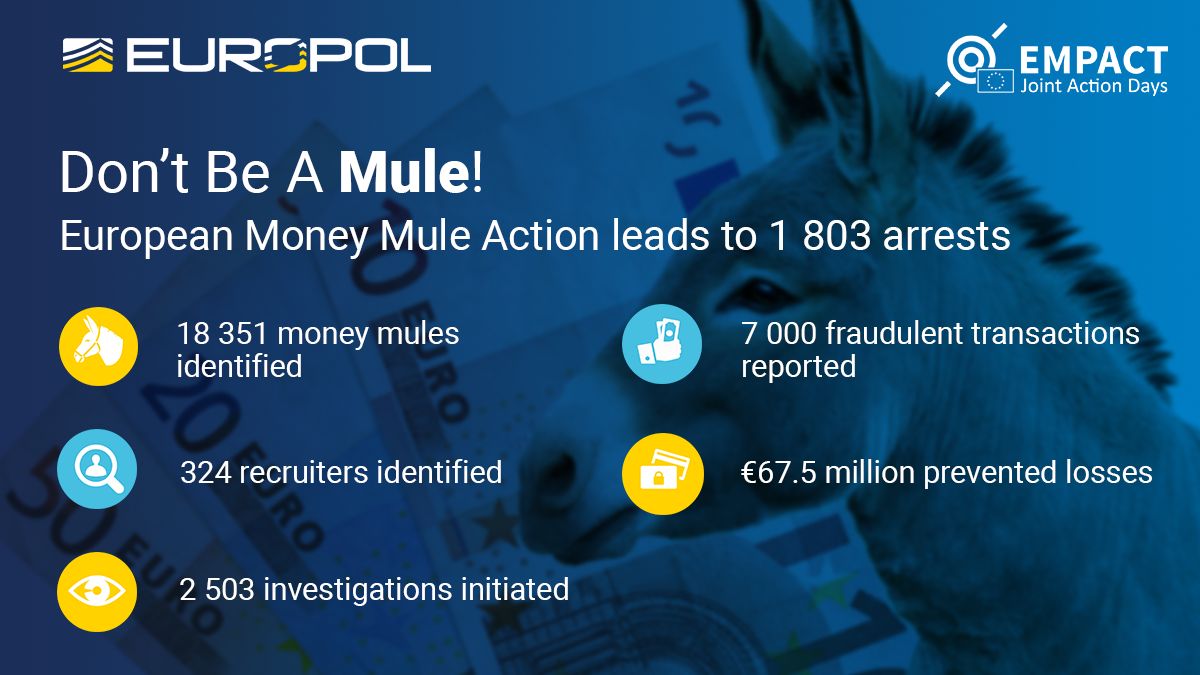European Money Mule Action Leads To 1,803 Arrests
International anti-money mule operation leads to 1,803 arrests & the identification of 18,000 money mules. The action was coordinated by Europol in cooperation with 27 countries across the globe, Eurojust, INTERPOL, the European Banking Federation, and the FinTech FinCrime Exchange.
Results From This Operation:
- 18,351 money mules identified
- 324 recruiters identified
- 1,803 arrested individuals
- 2,503 investigations initiated
- 7,000 fraudulent transactions reported
- €67.5 million prevented losses.
This was the 7th iteration of the European Money Mule Action, which is the largest international operation of its kind. It’s built around the idea that public-private information sharing is key to fighting complex modern crimes.
Investigation reveals money mules were laundering profits from online fraud schemes such as business email compromise and Forex scams.
Today saw the conclusion of the anti-money mule operation EMMA 7, an international action coordinated by Europol in cooperation with 27 countries, Eurojust, INTERPOL, the European Banking Federation (EBF), and the FinTech FinCrime Exchange. The operation resulted in 1,803 arrests and the identification of over 18 000 money mules. It also revealed that money mules were being used to launder money for a wide array of online scams such as sim-swapping, man-in-the-middle attacks, e-commerce fraud, and phishing.
Over roughly two and a half months of operations, EMMA 7 saw law enforcement, financial institutions, and the private sector, including Western Union, Microsoft, and Fourthline, cooperate in a concerted effort against money laundering in Europe, Asia, North America, Colombia, and Australia. As well as targeting the laundering of profits through money muling networks, investigators also sought intelligence on the sources of these illicit profits, shedding more light on the size and nature of the criminal economies that money mules serve.
Collaborating In The Fight On Money Laundering
This was the seventh iteration of the European Money Mule Action, or ‘EMMA’, which was established in 2016 on the initiative of Europol, Eurojust, and the European Banking Federation. It is the largest international operation of its kind, built around the idea that public-private information sharing is key to fighting complex modern crimes. Around 400 banks and financial institutions supported the action, reporting 7000 fraudulent transactions and preventing a total loss estimated at nearly €70 million.
EMMA 7 works based on private sector actors reporting incidences of suspicious or possibly illegal financial conduct to national law enforcement authorities. Similarly, law enforcement can ask financial actors to look into their own intelligence on potential money mules. With these inputs, law enforcement can paint a picture of laundering networks and then decide in each case how to react to the possible money muling activity.
EMMA provides a means for all these actors to confer, sharing intelligence that will help identify possible money mules and potentially lead to arrests. Europol supports each stage of the preparation by connecting the law enforcement partners and private sector partners and facilitating information exchange between them. In the operational phase, Europol provided analytical support that connected the transnational cases with the money muling networks behind them.
Most of the investigations under EMMA 7 focused on the international dimension of muling. Money muling operations see mules not only transferring money between countries but also traveling between countries themselves in order to set up bank accounts overseas. Criminals can then use these accounts later on in support of the money laundering process.
Awareness Is As Important As Action
The complexity of money muling operations, and law enforcement’s response to them, reflect how muling networks are created. Unlike many financial crimes, money mules can be recruited unknowingly into the criminal operation. The organized crime groups do this by preying on groups such as students, immigrants, and those in economic distress, offering easy money through legitimate-looking job adverts and social media posts.
Ignorance is not an excuse when it comes to the law and money muling; they are breaking the law by laundering the illicit proceeds of crime. For this reason, Europol coordinated the ‘#DontBeAMule’ awareness campaign with all participant countries, law enforcement, and the EBF on behalf of the European banks, as a means to prevent more innocent bystanders from being exploited by criminals and putting themselves at risk.
Eurojust participated in the operation via its dedicated liaison officer and stands ready to support cross-border investigations and judicial cooperation at the request of the national authorities involved.
EMMA is under the EMPACT Sub Priority Cybercrime NCPF (Non-Cash means of Payment Fraud), and is led by the Netherlands.
Participating countries: Australia, Austria, Belgium, Bulgaria, Colombia, Czech Republic, Estonia, Finland, Greece, Germany, Hong Kong-China, Hungary, Ireland, Italy, Moldova, Netherlands, Poland, Portugal, Romania, Singapore, Slovak Republic, Slovenia, Sweden, Switzerland, Spain, United Kingdom, United States.
Source: Europol





Leave A Comment